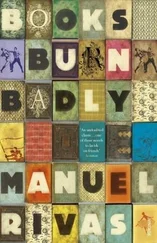Whenever he argued with my mother, he would use an expression I found cryptic, with a hidden meaning:
‘You are the Spirit of Contradiction.’
She never held back what she was thinking. She was sweet, but not docile. At that time, the laws regarding women were even more shocking than people’s attitudes towards them. A woman was a subordinate being. She could do nothing without her husband’s approval. But my mother could not accept such a submissive role, and my father knew it. So, whenever he felt thwarted, he would allude to the influence on my mother of that invisible creature, the Spirit of Contradiction, which soon formed part of our domestic mythology. In their own way, neither of them was particularly sociable. They constituted a pair of conjugal recluses, but their solitudes were different. My father avoided crowds whenever he could. When it came to sporting events, he experienced real aversion. He tried, unsuccessfully, to engender in me the same hatred he felt towards football. After that, he tried to keep me away from the grounds. We had a neighbour, Gregorio, a technician for Radio Coruña, who offered to take me along to Riazor Stadium. For my father, those epic hours when Deportivo was playing out its very existence, which was every Sunday afternoon, were a good time for us to go out in the garden. I felt miserable, and he would try to persuade me that paying to see two factions of adult men chasing after a ball, driven on by a roaring mob, represented a kind of defeat for humanity. Until he admitted his own defeat and I was allowed to go with Gregorio to Riazor. After leaving the stadium, we would drop by the house of some relatives. Their building was connected to a large hairdressing salon. As the adults talked, I would peer into that enchanted world, with its mirrored walls and the chairs with disturbing helmets in which heads would undergo a metamorphosis (that enigmatic expression, ‘to have a perm’!), a scene that is now deserted, but alert, with the futuristic nostalgia of murmurs, colours and aromas. The enamel of dragonflies flashing on absent nails. There was a charm about the place one resisted as much as one was drawn to it. The charm of what it would be like to be a woman. Or what one would be like as a woman. Back at home, after night had fallen, my parents were listening to the radio. They used to do this with the light out, the only illumination coming from the radio dial. Our house hanging on the hillside looked just like a ship. The wind whistling over the harmonica of the roof, the beams from the lighthouse licking our darkness. Special effects from outside that heightened the suggestiveness of the radio. We were both in and out. The voices and static formed part of nature. Life had a storytelling vocation. I had been at Riazor, that other bustling, suspended spaceship, amid the ebb and flow of roars. I had been in the fantastic hair salon, in that shadowy light of large chrysalises. And now, leaning on the window of night, I felt like an equal next to the Man Who Despises Football and the Woman Who Talks To Herself.
They could both be very silent or very talkative. I learned that language had seasons. Days when words sprouted, days when mouths rested, days when they talked to themselves, days when dry leaves fell from lips and went spinning off towards a bitter destination. There was a special characteristic about my father’s speech that made it different from that of most adult males. He never swore or cursed, even when he was expressing extreme annoyance. He never called on God, the Virgin, the saints of the Church or the angels in heaven. He never even bothered the devil. That seemed natural enough in a believer like my mother, but it surprised me in a man who never set foot inside a church. In fact, men at Mass on a Sunday were a rarity. They would attend burials, funerals and anniversaries. Also High Mass on a feast day. But even on those occasions most would remain outside, in the yard, and those who went inside would take up position at the back of the building. Men didn’t kneel. They remained standing in that area of half-light under the choir loft. It was also strange for a man to receive communion. To participate in communion, to receive the sacred form, required confession. And that — going to confess to the priest — was something that tried my father’s patience. Whenever they argued about this, it would have been normal to expect a stream of curses.

The author’s parents at their wedding
‘What is the priest? He’s …’
Airily, he answered his own question with the most outrageous euphemism he could find:
‘A man! He’s nothing more than … a man.’
But that came later, long after our first fear. Memory goes a-wandering, it crosses fields, darts across the Avenue, walks like Charlie Chaplin the Tramp inside the Hercules Cinema. Or walks like women with things on top of their heads. All of them — well, almost all — carried something. A prolongation of basic things. Take, for example, the walk of the milkmaid. My mother would begin by delivering to Monelos. Then she’d get on the trolleybus and start again on San Xoán Street, at Asunción’s shop. One of the places she served was a military establishment attached to the cavalry. One day, a soldier whispered to her, ‘You can put water in the milk, don’t worry, they add even more once it’s here.’ Meanwhile, we were living on Marola Street, renting the ground floor. María can’t have been three and I was under two. Back then, before it was blocked by the violent actions of the land registry, the street had an open horizon and ran into the surroundings of the Tower of Hercules. Very near our home was a place known as the Farmhouse. No, it wasn’t an ethnographic museum. It was a real farmhouse at the limits of the city with the sea. A house with cows and a traditional cart. That was a real journey into space, going on that cart. The fields that bordered the provincial prison were fertile ground with lush crops and potatoes that tasted of the sea. There were meadows, willows, a choir of blackbirds in the field next to Lapas Beach. The cows moved between the city limits and the cliffs. In my memory, they represent a canvas of mythological pop art. How the Tower of Hercules, declared a world heritage site, could benefit from a few amphibian cows in the sun! That space is now occupied by fixed sculptures and a municipal obsession with lawns, the green acrylic laminating the sylvan colours. The cows of time have disappeared. They’re mooing out at sea.
We were alone on that ground floor on Marola Street. We were sitting on the floor. I was playing with a toy lorry. There was a loose tile, which could be removed. Underneath it, a bug, a cockroach. I was trying to grab it, with good intentions, I wanted to give it a ride on the lorry, but it kept running away, anticipating my hand’s movement. And then María lifted her head, all alert, all of her smiling. She jumped to her feet and ran towards the window that looked onto the street. I followed her, as always. In symmetry. She walked with her feet pointing outwards, bandy-legged, and I was pigeon-toed, with my feet pointing inwards. Each of us walked as best he could. Aunt Paquita had a limp. She would exclaim joyfully, ‘The lame one’s here!’ And there’d be murmuring: ‘How pretty you look! How well you limp, Paquita!’ But now we were alone. María ran with her feet pointing outwards and I ran with my feet pointing inwards. We heard music in the street. Saw clowns throwing streamers. Fireworks. A party. The window was a marvellous screen. Until suddenly two monsters appeared, filling it completely, with heartless eyes, their noses banging against the glass. We’d never seen danger up so close before. The horror.
Читать дальше













